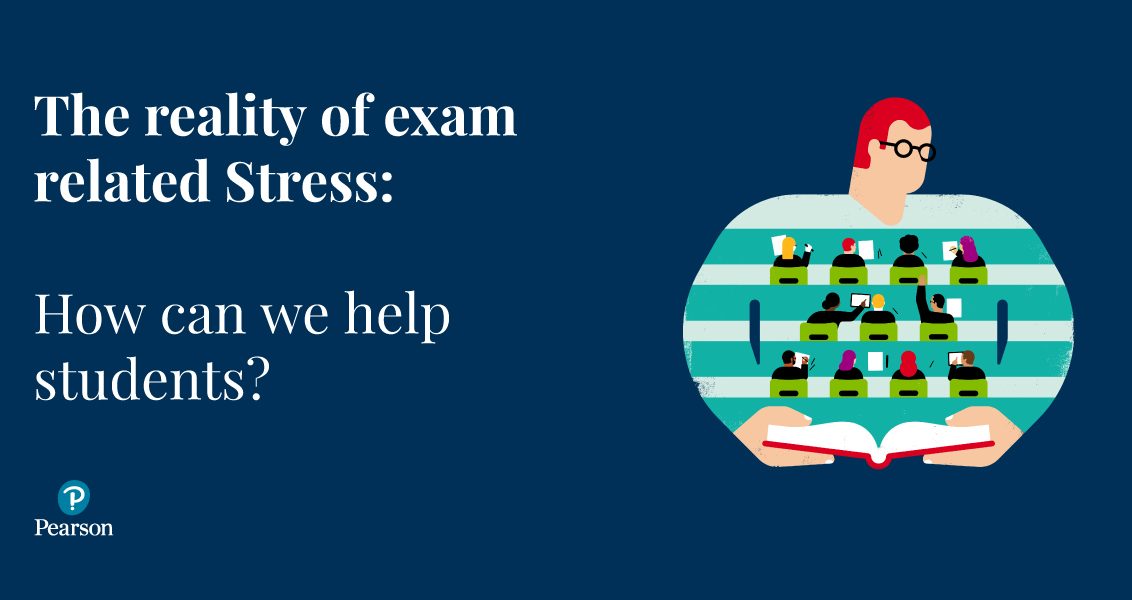
Why are exams the top cause of stress in teenagers and how can we help them deal with it?
It is a known facet of human nature that when under pressure, our body sees it as a threat to survival and activates a stress response1. In the current reality of education, exams are reportedly2 perceived by teenagers in secondary education as their top cause of stress, over body image and peer pressure. Stress in early formative and adolescent years, especially for prolonged periods, can have a significant impact on the future mental health of that teenager in adult life3. In this piece, we’ll take a look at why the brain’s stress response is triggered by exams, why this is particularly challenging for teenage students and how we, as educators and parents, can support them through it.
Why do exams trigger a stress response?
Firstly, it’s important to note that stress is normal – it is not a weakness, nor is it something to which you are immune if you are deemed to be ‘resilient’. The stress response is an innate human process. It is a an evolutionary survival mechanism deeply rooted in our very earliest primitive need to escape immediate danger. In other words, it is automatic, involuntary and very necessary for survival in some situations. The challenge we face in modern society is that we have evolved to allow this stress response to be increasingly triggered by situations which are not really an immediate threat to our survival, such as an exam. However, the process is so automatic that it is triggered even before our analytical mind can work out the sensory messages which triggered it in the first place. This is helpful when it means we are able to jump out of the way of a bus even before we’ve even properly registered the sight of the bus. It is less helpful when it has spiralled us into panic at the prospect of an exam before we’ve really had a chance to notice it has happened.
Why does this happen? Quite simply, the brain sees the high stakes of an exam as a threat to survival. But as with all assessment stakes, it is not necessarily the nature of the exam itself which causes the stress. It is actually the consequences of the exam result and what doors it might unlock – the concept of being tested and judged, of being compared to a standard and being found lacking. It is thought that this too is rooted in more primitive times, about 70 million years ago when our survival also depended on being part of a pack, a community. If we were seen to be lacking by the tribe, we might be cast out, and isolation was a very dangerous thing. No social link meant no share of the food and no protection from predators4. Fast-forward 70 million years to the exam room and our slightly messy human brain associates the judgement of an examiner as a threat to survival: a threat to our social link. And with UK and international exams getting tougher5 year on year, this should come as no surprise.
Why is it particularly challenging for teenage students?
The stress response is hard enough to deal with in inappropriate situations as an adult. However, teenagers are really on the back foot due to the immense developmental changes occurring in their brains at the same time as facing this pressure.
Our brains are plastic which means that every time we encounter a situation or try something new, we form a neural connection in the brain in the associated area. We are habitual creatures and this makes it easier for the brain to automate our reaction next time.
In the teenage brain, the prefrontal cortex (which deals with analysis, strategy, planning etc) is working on overdrive. However, our cerebellum (which handles both physical and emotional coordination) is comparatively under-developed. This means our amygdala and hypothalamus (the areas responsible for triggering and delivering the fight-or-flight stress response) have little regulation because the teenage brain simply has not developed this properly yet. So stressful situations seem so much more stressful, and the underdeveloped cerebellum makes it really hard to make sense of the comparatively over-analytical thoughts and ruminations of the prefrontal cortex. Stress escalates and takes on a much more definite and concrete status – in other words, not only do they feel stress more acutely, it is much harder for them to regulate it or to see the bigger picture and that it is simply a wave to ride out.
How can we help our students?
It is common to talk about helping students be more resilient in the face of academic pressures6. However, in some settings this can be overused with an implication that resilience means we are immune to stress – that we should be able to simply not feel it. As we have seen, this is very hard to achieve, particularly for teenagers. When we really look at the idea of resilience, it refers not to never experiencing tough situations, but rather to developing an ability to bounce back, or to ride out, difficult times.
resilience7
(also resiliency)
NOUN
mass noun
• The capacity to recover quickly from difficulties; toughness.
‘the often remarkable resilience of so many British institutions’
• The ability of a substance or object to spring back into shape; elasticity.
‘nylon is excellent in wearability, abrasion resistance and resilience”
In other words, the stress may be felt to a certain degree, but using mindfulness and other such relaxation and mindset techniques, we can help our students experience, but not panic about, the pressure of exams. And if stress does get triggered, we can help them see that this is ok, it is normal, and provide mechanisms for how to move on healthily and productively.
More on this next time in the next blog in the series, looking specifically at how mindfulness can help.
Want to learn more?
Register for the Mindfulness as a tool to help students cope with exam stress webinar with Amy Malloy, helping you put mindfulness into practice!
In this practical and theoretical webinar, we’ll be exploring how mindfulness can actively help students prepare for exams in a healthy and relaxed way.
This webinar will take place twice, at 8am and 4pm UK time on 8 May 2019.
References
1 https://www.health.harvard.edu/staying-healthy/understanding-the-stress-response
2 https://www.independent.co.uk/news/education/education-news/gcse-results-day-2018-exam-stress-grades-student-mental-health-body-image-natasha-devon-a8503301.html
3 https://www.who.int/news-room/fact-sheets/detail/adolescent-mental-health
4 Harari, Y. N. (2011) Sapiens: A Brief History of Humankind.
5 https://www.gov.uk/government/statistics/key-stage-4-and-multi-academy-trust-performance-2018-revised
6 Martin, A.J. (2002). Motivation and academic resilience: Developing a model of student enhancement. Australian Journal of Education, 46, 34-49. DOI: 10.1177/000494410204600104.
7 https://en.oxforddictionaries.com/definition/resilience
About the author
Amy Malloy is the founder of No More Shoulds.com, teaching mindfulness for healthier, kinder minds. With 15 years’ experience in teaching and educational publishing, she now combines first-hand understanding with wellbeing practices to help educators and students find inner calm in a stressful world.

